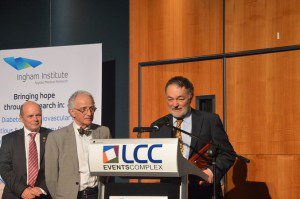
AN audience filled with sponsors, supporters, researchers and scientists burst into applause as the Ingham Institute announced the winners of three prestigious awards at its night of nights, the second annual awards dinner last week.
Held at Liverpool Catholic Club, the event once again acknowledged and celebrated the significant efforts of Ingham Institute researchers for their achievements during the past 12 months.
Three major awards were presented on the night: the Lady Mary Fairfax Distinguished Researcher Award, the Excellence in Teaching Award (sponsored by the South Western Sydney Local Health District – SWSLHD) and the Early Career Researcher (sponsored by Liverpool City Council).
All three awards carried prizemoney of $5000.
Special presentations were given on the night by Professor Warwick Anderson, CEO of the National Health & Medical Research Council (NHMRC) and Jai Rowell, Minister for Mental Health, Assistant Minister for Health and Member for Wollondilly, and nwho represented the Premier of NSW on the night.
“We have some of Australia’s best talent working at the Ingham Institute on a range of critical disease areas affecting Australians including cancer, early childhood disease, injury and mental health,” said Ingham Institute Research Director, professor Michael Barton.
“The night served as a wonderful opportunity to reflect and celebrate our researchers’ achievements and give them the recognition they deserve for improving the health and wellbeing of Australians.”
First cab off the rank was the Lady Mary Fairfax Distinguished Researcher Award, which was won by Professor Guy Marks, group leader of the Ingham Institute’s Department of Respiratory Medicine.
Professor Marks’ research career spans over 20 years which has established him as an international leader in lung health, with particular focus on asthma, chronic obstructive pulmonary disease and tuberculosis.
Most recently, much of his work has focused on the burden of these conditions in developing countries such as Vietnam and the Pacific islands.
Professor Marks has also been successful in securing research funding to the tune of over $35 million throughout his career.
This has included a number of National Health and Medical Research Council (NHMRC) Practitioner and Research Fellowships, and in both 2010 and in 2013 he was ranked number one research fellow by NHMRC, which is one of the most of prestigious awards in Australian medical research.
Next in line was Dr Bjorn Espedido from the institute’s Antibiotic Resistance and Mobile Elements Group (ARMEG) in the Infectious & Inflammatory Diseases stream, who got the gong for the Early Career Researcher Award, proudly sponsored by Liverpool City Council.
Presented by Liverpool Mayor Ned Mannoun, Dr Espedido’s award highlighted his outstanding work to combat Methicillin-Resistant Staphylococcus aureus (MRSA) (or “Golden Staph”), and other multi-resistant organisms (MROs), also known as superbugs, in Australian hospitals.
Dr Espedido plays a focal role in one of the largest-ever genomics studies aimed at understanding the superbug Golden Staph in collaboration with the Wellcome Trust Sanger Institute.
Another career highlight is his work as investigator on an Astra Zeneca Industry Project Grant to examine the efficacy of Ceftaroline, a recently approved antibiotic for the treatment of MRSA infections.
To support and foster the growth of next-generation researchers, Dr Espedido is a co-supervisor for one honours student and one doctoral student and mentors two additional postgraduate students in the laboratory.
The worthy recipient of the Excellence in Teaching Award, sponsored by the SWSLHD, was Professor Iain Gosbell, Group Leader of the Antibiotic Resistance and Mobile Elements Group (ARMEG).
In addition to leading the ARMEG team to eradicate the superbug Staphylococcus aureus (MRSA) or Golden Staph, Professor Gosbell has established himself a strong teacher and mentor to the research community in South Western Sydney.
He was appointed the Foundation Chair of Microbiology & Infectious Diseases, School of Medicine, University of Western Sydney in 2009 and has attracted several honours, masters and PhD students throughout his career.
Professor Gosbell’s contributions to teaching and research in Microbiology and Infectious Disease were also recognised nationally when he was awarded the bioMérieux and Australian Society for Microbiology Identifying Resistance Award in 2013.
Ingham Institute Chairman Terry Goldacre congratulated all of the winners and nominees for their tremendous achievements and efforts in creating hope for all Australians suffering from critical disease.
“The Ingham Institute’s research team consists of some of the best medical minds in Australia and continue to kick massive goals on a national and international level. In my eyes, everyone is a winner tonight,” he said.
